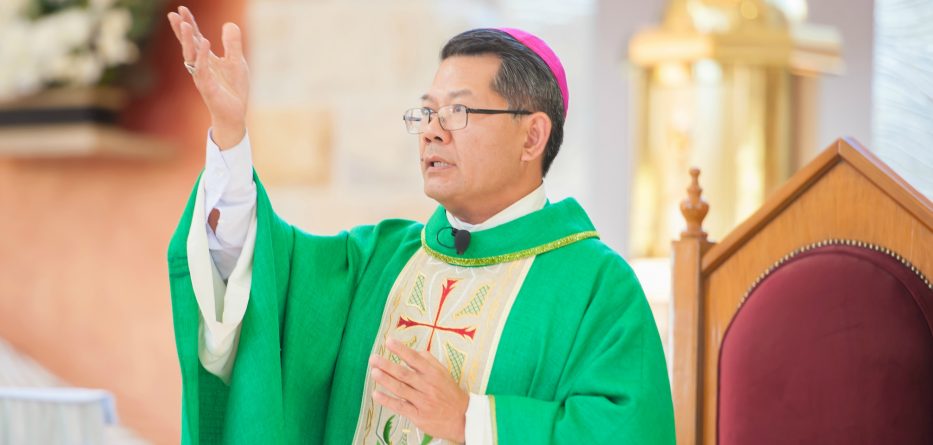Most Reverend Vincent Long Van Nguyen OFM Conv DD STL, Bishop of Parramatta
Homily for the 7th Sunday in Ordinary Time Year C 2019 on the occasion of the Opening of the Seminary Year at St Patrick’s Cathedral, Parramatta
Readings: 1 Sam 26:2-23; 1 Cor 15:45-49; Luke 6:27-38
24 February 2019
Called to live the new ethics of the Kingdom
Brothers and sisters,
One of the most well-known and respected figures associated with the ancient and mysterious land of India is undoubtedly Mahatma Gandhi. He rallied his people to the cause of justice, freedom and independence. He fought against the injustices of colonialism.
But what marked him as a universal figure was his uncompromising principle of non-violence. He refused to meet violence with violence, hatred with hatred and a tit for tat approach which is but all too familiar in human conflict. Gandhi drew inspiration for his peaceful and non-violent struggle from Jesus whom he described as the greatest teacher of non-violence and the man of peace.
Today’s Gospel is the very source of Gandhi’s inspiration. It contains the central teaching of Jesus on the standards of behaviour expected of his followers. It not only sets them against the ruthless, competitive, inhumane, survival of the fittest mindset of the Roman Empire.
It also challenges them to go beyond the old Mosaic law that stops short of loving their enemies and going the extra mile with those indebted to them. Jesus’ new ethics of His Kingdom stretch the limits of our capacity to love in the way that mirrors the boundless mercy of God himself.
In the first reading, we have a glimpse of such divine mercy through the benevolence of David towards Saul. In earlier episodes, David had been chosen to replace Saul as the new King of Israel. For Saul had failed to live up to his call of the true shepherd of Israel.
He had abandoned service in pursuit of power. David, instead, proved to be a man of peace and magnanimity – at least towards his fellow Jews. In the cave where Saul lied in a deep sleep, David had a perfect opportunity to get rid off his rival. But he chose not to. He entrusted himself to God, saying “The Lord repays everyone for his uprightness and loyalty.”
In the Gospel, Jesus continues to instruct his disciples on the ethics of the Kingdom. The Beatitudes we heard last Sunday already reveal a value system that is completely at odds with the behavioural standards of the world. They are not simply spiritual bribes or quid pro quo injunctions. In God’s scheme of things, the blessed are the anawim or the remnant faithful who live at the edges because of their fidelity. They exchange the security of wealth, privilege and status for the uncertainty of vulnerable trust, faith without sight, strength without violence and love without counting the cost.
In today’s episode, Jesus pushes the vulnerability of discipleship to fresh extremes. He stretches the limits of love and redefines its meaning in the process. “You have learnt how it was said: eye for eye and tooth for tooth. But I say this to you: Offer the wicked man no resistance”. This and similar commands like “love your enemy and pray for those who persecute you” seem unrealistic and unachievable in the age of terrorism.
Yet, disarming violence with non-violence and especially by benevolence is precisely the fundamental ethics of the Kingdom. It is at the core of Jesus’ teaching and therefore the core of Christian discipleship. We are challenged to go beyond the letter of the law, beyond the minimum requirements to loving others at our own cost. We can do so on the basis of knowing ourselves to be enriched by the divine generosity and therefore to act with such generosity towards others is not impossible.
Dear brothers and sisters,
Today, we especially pray for our seminarians as they begin their academic year. We are truly blessed with these young men who have committed themselves to a journey of vocational discernment. I am deeply indebted to the formation team led by Fr John Hogan, the Rector of our Holy Spirit Seminary.
Seminarians are formed with the people and for the people, not for themselves. Therefore, I invite all God’s people in the diocese to be the extended formation community for these young men. You do so by your prayer, support and when and where possible, even accompaniment.
I firmly believe that shepherding is not a one-way street. The shepherd remains not apart from, but, a part of the faith community. Though he preaches, he listens with open heart to the preaching of others. Though he blesses, he also bows his head to receive the blessings of others. Though he leads with a leadership of service, he must be willing to be led by others. Though he ministers, he also recognises the ministerial charisms in others and works with them in collaborative ministry for the good of the community.
The Kingdom vision of Jesus guides all of us as we endeavour to be a community that reflects the divine pathos and compassion. In the post-Royal Commission society, we Catholics cannot be a credible force for good if we persisted in the culture of clerical power, status and privilege.
Instead, we must learn to live by the upside down, inside out ethics of the Kingdom. May we model ourselves on Christ the new Adam as we embrace wholeheartedly a discipleship of humility, vulnerability, compassion and powerlessness.








